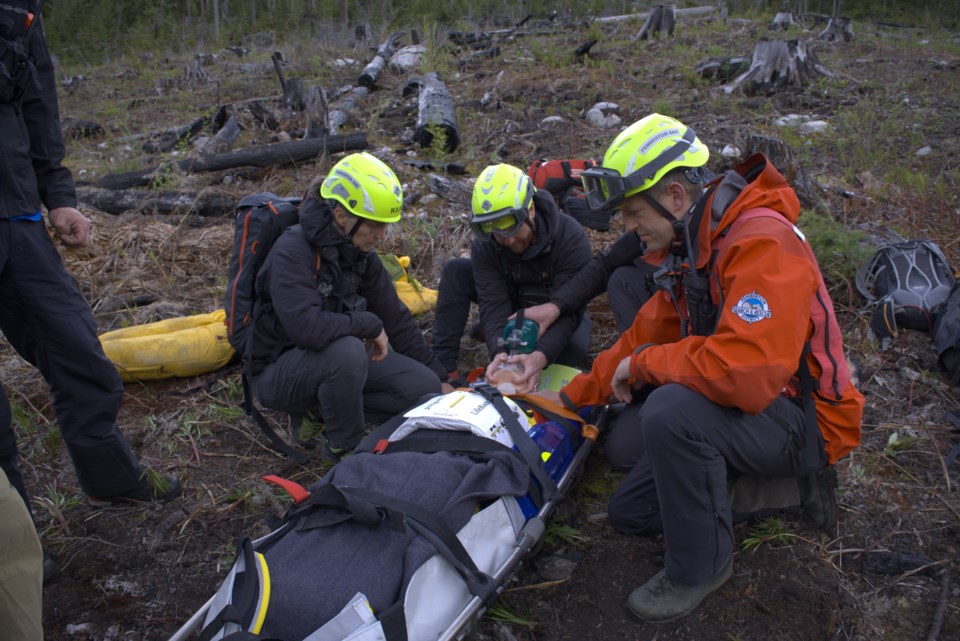Emergency health-care in Pemberton is getting a boost thanks to a new AutoPulse device—an innovative machine that can perform chest compressions on a person in cardiac arrest.
The machine should allow doctors, paramedics and nurses to provide the best care possible to patients in Pemberton. It can also buy time for patients who need to be transported to Whistler or Vancouver.
Jamie Wakeling was determined to get an AutoPulse for the village, having seen first-hand just how effective the machine is. He told Pique he set up a working group to try and procure the device.
“A little while ago, we determined through our medical program that we were kind of lacking in capability to transport patients that were in cardiac arrest,” said the primary care paramedic and search-and-rescue volunteer. “The AutoPulse is a mechanical CPR device. There is a board and then there’s a big strap that goes across the person’s chest. The machine is very intelligent and it does compressions for you with a band.”
The purchase was made possible through a grant from the Whistler Blackcomb Foundation. In total, it cost about $23,000.
The AutoPulse will be an invaluable asset to both the Pemberton Health Centre and Pemberton District Search and Rescue, especially when time is of the essence.
“When you bring some patients in in the middle of the night, there’s often only a doctor and a nurse or two,” said Wakeling. “If you’re lucky there might be an ambulance crew there. If a patient was to suffer a cardiac arrest, it manages to free up multiple people to provide the best care possible to that patient. I would imagine at some point in the future it will give us the ability to move patients from a terrible situation to areas where we can optimize their ability for a successful outcome.”
Wakeling explained the machine can perform compressions longer and more accurately than any human could.
“It’s providing us with the ability to provide the best care to folks. I had used the devices previously so I was pushing for us to get one. I had seen the benefits in using one of these devices,” he said. “At the end of the day, it’s providing better compressions than a person will ever do. They can go from 45 minutes to an hour on a single battery. We can transport people a very long way.
“From the winter sports side of things, if someone suffers a hypothermic arrest in the backcountry, it allows us to keep moving until we get to Vancouver. Thank you to the Whistler Blackcomb Foundation for supporting Pemberton Search and Rescue. We truly appreciate the support we have received from them over the years.”
Dr. Nick Fisher, Pemberton’s emergency physician and local medical director, agrees the device is a total game-changer. “Its main benefit is that it’s far superior to anyone doing it themselves,” said Fisher. “Manual CPR can be effective but we are all human. It’s tiring. It wears you out, especially if you have to do it yourself for long periods of time. The machine does perfect compressions every time. The single biggest factor in improving survival in cardiac arrest patients is high-quality CPR combined with early access to electricity in the form of a defibrillator.”
Dr. Fisher explained people who suffer cardiac arrest due to hypothermia tend to do really well with prolonged CPR.
“For search-and-rescue teams, the biggest benefit that it holds is the ability to provide CPR to patients who are hypothermic,” he said. “CPR is often the difference between life and death. That’s why having a device like this is so important.”
The family doctor stressed there are local examples of this, such as when a woman defied medical odds after a miraculous rescue from a Garibaldi Park tree well. Christine Newman received four hours of continuous CPR.
“I would expect every facility to have these in the future,” said Fisher. “The devices are so effective at pumping blood around the body through external compressions that some people have maintained a level of consciousness, were making purposeful movements and were even talking. We are very grateful to have it.”




